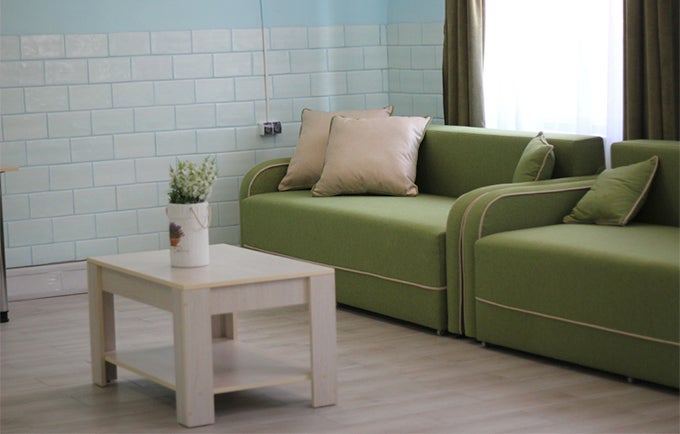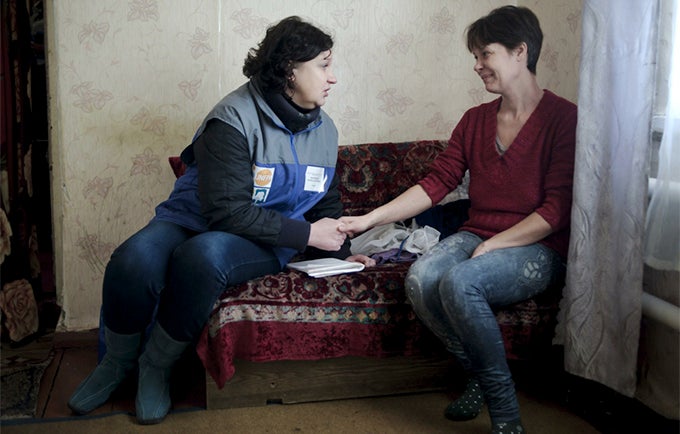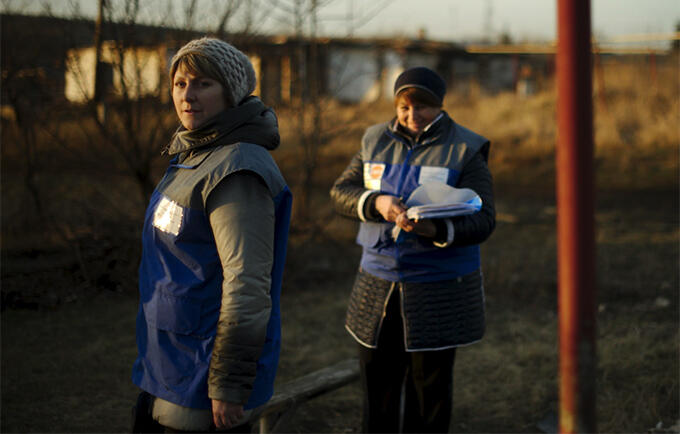SLOVIANSK, Ukraine — When Anna’s abusive husband threatened her with a knife, she knew it was time to get away. The next day, she pretended to take her children to school, but instead fled with them to her sister’s house in another city. She didn’t want to hide out there forever, but she didn’t know where else to turn.
Then Anna heard about UNFPA’s mobile teams, which offer psychosocial support to survivors of gender-based violence in eastern regions of Ukraine. The team she called helped her find a place in a municipal-run shelter, where she and her children are now living safely.
Anna is receiving assistance at the shelter in finding a job and permanent housing, and her two boys are attending school again.
Many women like Anna don’t know how to access the resources they need to escape violence at home and restart their lives. UNFPA’s mobile teams, which began as a pilot project in five regions of Ukraine in 2015, are now providing these crucial connections in 12 regions of the country. Now, they will also serve as a model for a new nationwide system of domestic-violence response.
In August 2018, Ukraine’s Cabinet of Ministers approved a set of provisions on mobile teams for social and psychological assistance to people affected by domestic and/or gender-based violence that institutionalizes these innovative services as part of the government response to this crucial issue. The new regulations allow local councils and city governments in all regions of the country to establish mobile teams that can reach women, especially those living in rural areas, who would otherwise have difficulty receiving social services.

A shelter for survivors of gender-based violence in Vinnytsya, Ukraine.
The mobile teams are being implemented in partnership with the Ministry of Social Policy of Ukraine with the financial support of the Government of the United Kingdom. Operating in groups of three specialists — a coordinator, a psychologist and a social worker — who make field visits to families in need, they are already transforming the work of social service providers.
“Their ability to respond promptly to the approximately 850 calls we get each year from families affected by domestic violence is what distinguishes the mobile teams,” says Volodymyr Dziumak, deputy director of the Donetsk Oblast Centre for Social Services for Family, Children and Youth. “This was a completely new way for us of working with the population of Donetsk oblast. The mobile teams can monitor a family’s situation, make repeat visits to their home, bring a survivor of violence to the Centre for Social Services, or hand the case over to other state organizations or lawyers who can provide the needed assistance.”
Anna had been with her husband for more than a decade when he began to beat her. She believes his drug use led to his change in behaviour. “He started accusing me of being unfaithful to him for all those years, even though during this time I rarely left our house or yard. Then he started creating false profiles of me on various dating sites and demanding to know why my photos were on such sites,” Anna says. During one of those confrontations, he brought a knife with him, prompting Anna’s decision to leave.
When Anna finally connected with UNFPA’s mobile team, the social workers noticed some aggressive tendencies in her two sons — a common response observed in children who witness or experience domestic violence. The boys are now getting psychological help to try and ensure that they don’t repeat these patterns as adults.
According to the research “Masculinity Today: Men’s Attitudes To Gender Stereotypes And Violence Against Women” carried out by UNFPA Ukraine in 2018, around 27 per cent of men witnessed their mother being physically abused by their father or stepfather, and 50 per cent experienced physical punishment from their parents during childhood.

A psychologist from one of UNFPA’s mobile teams in Ukraine speaks with a survivor of gender-based violence. Photo: Maks Levin/UNFPA
“Based on my practice, I can say that most male aggressors were victims of or witness to domestic violence as children,” says Lizaveta Krasnoyarska, a psychologist working on UNFPA’s mobile team from the town of Slovyansk. “This affects the formation of their personalities a great deal. People follow the pattern of ‘I suffered these offences, now I will inflict them on others’ without even reflecting on it.”
Helping families understand the dynamics of violence, and helping women understand that it is not something normal that they have to tolerate, is another important part of the mobile teams’ work, Krasnoyarska says.
“Even when one talks about situations where a woman allegedly ‘provoked’ her husband, she cannot be considered responsible for his violence against her. Because it’s the man who chooses how to react. He is responsible for his decisions,” she says.
While there is still plenty of work for the mobile teams to do in terms of combatting gender-based violence, they look forward to having some new tools at their disposal next year. In 2019, the Law on Prevention and Combating of Family Violence will come into effect in Ukraine, further improving the response to violence and laying out specific penalties for perpetrators.



